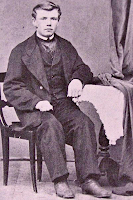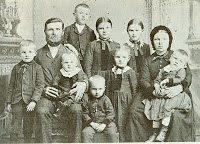I Remember Great Grandpa Loewen
 Solomon, the wisest man who ever lived, assessed life as meaningless in Ecclesiastes. A ‘treadmill’ life is certainly that. Then Ecclesiastes 1:9-11 says:What has been will be again, what has been done will be done again; there is nothing new under the sun. Is there anything of which one can say, “Look! This is something new”? It was here already, long ago; it was here before our time. There is no remembrance of men of old, and even those who are yet to come will not be remembered by those who follow.
Solomon, the wisest man who ever lived, assessed life as meaningless in Ecclesiastes. A ‘treadmill’ life is certainly that. Then Ecclesiastes 1:9-11 says:What has been will be again, what has been done will be done again; there is nothing new under the sun. Is there anything of which one can say, “Look! This is something new”? It was here already, long ago; it was here before our time. There is no remembrance of men of old, and even those who are yet to come will not be remembered by those who follow.
The last section caught my eye and my heart – There is no remembrance of men of old, and even those who are yet to come will not be remembered by those who follow.
Why then is Abraham, Jacob, Isaac, David, Jonah of old remembered? What makes man immortal- remembered? Writing a hymn, helping others, penning book after book? Not always. But what makes any life meaningful, when ‘day after day’ tasks do not become mundane? It is when we look for purpose and meaning is when we look above the sun and follow the Son of God. When our faith is in our Lord Jesus Christ, the monotony of daily life has purpose and meaning.
In this 2009 year of economic turmoil, we wonder what to hold on to. Where can we find hope and inspiration? After reading some of Esther Loewen Vogt, granddaughter, and Solomon Lepke Loewen’s writing of his father, Jacob Loewen, I can see why Jacob Loewen, my great grandfather is a name I will remember, and a name I want to share with my children, grandchildren and great-grandchilden. I know where to find hope, just as he did as a young man in the turmoil of Russian climate of turmoil. In Jesus Christ, and Him only.
Dr. Jacob Loewen was born to Jacob and Anna Loewen at Waldheim, South Russia, on October 5, 1855, and died at Hillsboro, Kansas, June 19, 1941 at the age of 85 years old. He was a strong, healthy man. In 1873, he, with his parents, joined the exodus of Mennonites from Russia to America, the land of opportunities and religious freedom. Although the Leppke family was warned against leaving for United States. They were told that when they crossed the Mississippi River, the Indians would rob them, burn their homes and even scalp them. Grandfather Leppke, Justina Leppke’s father, said that God protected Daniel in the Lion’s Den and He could protect them as well. Yes, they encountered Indians who paid ‘peeping window’ visits, but they left the peace-loving Mennonites alone.
 Each Mennonite family packed a wooden trunk with red winter wheat seeds, a few clothes, a German Bible and a hymn book, and other contents to begin a new life in a strange land. When I look about my house, I wonder what I would pack in a trunk to survive in a new land. What would be important?
Each Mennonite family packed a wooden trunk with red winter wheat seeds, a few clothes, a German Bible and a hymn book, and other contents to begin a new life in a strange land. When I look about my house, I wonder what I would pack in a trunk to survive in a new land. What would be important?
Jacob Loewen, in the new land, enrolled in the little Gnadenau sod school, built in 1874, so he could learn the English language. He stayed only several weeks as his interests lay in tilling the soil and improving his father’s orchards of mulberry, apricot, peach and cherry trees.
After Jacob married Justina Lepke, he saw other avenues of service such as his dental career. He pulled his mother’s loose teeth, and began extracting teeth for others as word was spread, without the benefit of anesthesia. Dentists and doctors were often miles away from the small settlement near Hillsboro, Kansas so people began to flock to the ‘tooth puller’.
One neighbor rushed to the field where Jacob Loewen sat on the binder cutting wheat. He wanted the pain-causing tooth pulled. Jacob whipped a pair of pliers from the binder’s toolxbox, wiped it carefully on his trousers and yanked out the offending molar. The man was relieved of pain and rode away.
The old medical journals tell of the efficacy of ‘blood-letting’ by tapping the vein of the elbow, so that patients were relieved of old stagnant blood so that illnesses disappeared. Jacob learned this art and now helped those who believed to a longer life on the prairie.
One day little Henry fell and fractured his arm. The one settlement doctor was away on business. It was up to Jacob to set his arm. He did so capably and for years people came to have their broken bones, aches and pains taken care of. He used wood splints and later aluminium. There were no x-rays, for Jacob could ‘feel’ if the bone was set right. He also practiced Swedish massage helping many with aching muscles and backs.
William Schaeffler, Hillsboro’s merchant, fixed up a room in his store for Grandpa to see his ‘town patients’ one day per week. (Does this sound like deja-vu in Walmart stores of today?) Later, when Jacob and Justina built the big two story house on South Washington for $4000, Grandpa included a small ‘doctor room’.
Did Jacob Loewen grow wealthy as a doctor? Since he wasn’t a licensed practitioner, he couldn’t charge a set fee. People paid what they could afford. He usually received 75 cents for pulling a tooth and for massaging, he averaged a $1. Some paid him a dime. He turned no one away. health insurance and medicare were unheard of in his day. It was a matter of loving God and loving others.
In his ‘doctor room’, his cupboard reeked with remedies and tucked away in one corner was the inevitable sack of peppermint candy for the 60 grandkids. When I was about 10 years, we visited Great Grandpa and Grandma. Great Grandpa took us into his ‘doctor room’ and sat at the huge roll top desk. He carefully rolled it back, revealing a container of round mints, the size of three stacked nickels, imprinted with three X’s. The room was darkened and it smelled a bit musty. The medicinal smell lay just benea the the strong odor of peppermint. I didn’t know his history or his agile, fertile mind, but I knew he was kind and cared about me. He stroked his long white beard and contemplated me as he asked me questions and gave me pepperments.
Medicines were difficult to obtain, so this dentist – farmer – doctor took to apothecary work as well. The fats, herbs and spirits he brewed into medicines and ointments became locally in demand.
- He dried rain worms on the tool shed roof and extracted their fats for his salves.
- He scooped red ants into spirits of alcohol for more effective liniments for relieving aching muscles.
- He simmered goose-grease and sulphur for other cure-alls. (If is long-suffering Justina complained of the stench in the tool shed, she did it graciously, for weren’t these all gifts from God?
Once his granddaughters developed (Esther Loewen Vogt, author, writes of this) an itch that continued, and in desperation, they finally showed it to Grandpa. He rummaged in his ‘medicine’ cupboard, stroking his white beard as he searched. “I’ve got the very thing for that.” The odor was horrible, but after the second application, the itch disappeared.
Some of the recipes that were listed in Jacob Loewen’s records were:
- splitting headache. bodily pain – 1 teaspoon each of vinegar alcohol, arnica, turpentine, mustard, horseradish white sulfur and red pepper.
- Linament, used externally: alcohol, 4 oz, camphor gum and gum of myrrh – each 1/2 oz, oil of turpentine, oil of sassafras and chloroform -each 1 oz, oil of origanum and aqua mmonia – 2 oz each – mix well.
- Influenza, colds, coughs : 1 pint raw linseed oil, 1/34 oz each of sassafras oil, hellock oil, origanum oil and peppermint oil and 1/2 oz of camphor oil – mix, take 3 to 1`4 drops on a piece of sugar – also good for burns
- To break a high fever a patient was placed in a sweat wooden chamber with only their head showing, wearing a night shirt (pajamas not hear of then), sitting on a chair in the box with a small alcohol lamp lit and placed under the chair. The heat caused profuse sweating. After 30 minutes, the patient was dried off, and placed into a bed. Many fevers would be gone with one treatment.
There were few undertakers on the prairie. Jacob Loewen took care of that job in his earlier years. He prepared dead bodies for burial by packing ice – when it was available – or cold sand when it wasn’t around the bodies until the funeral services could be held. In 1900, he paid $15 for a small casket for his two year old daughter who died that year.
Jacob Loewen also cared for animals. For animal cuts, he applied the plentiful cowebs in the barn to staunch the bleeding.
Jacob’s spiritual life was nurtured each morning at the breakfast table by reading a chapter and praying while 13 young stomachs groaned in hunger. The singing of a hymn climaxed the close of each meal. He always showed an interest in his children and sixty grandchildren until the very last illness resulted in his death at the age of 86. He and Justina celebrated 62 years of marriage in 1940.
Jacob Loewen was gifted, versatile and dedicated to helping others. He nobly led the way for civilization and progress on the prairie and yet his life, along with Great Grandma Justina Loewen, was deeply rooted in Jesus Christ. He also bought the first Ford car in Marion County, Kansas. A pioneer in all respects.
Yes, I remember Jacob and Justina Loewen, and I am inspired and challenged by their lives, their courage, and most of all their abiding faith in Jesus Christ.
*Thank you to Esther Loewen Vogt and Solomon Leppke Loewen for writing/compiling the information about Jacob Loewen.


Thank you, J-Dawn for your comment. It is encouraging. Everyone has a special family, but the older I get, the more I appreciate a Christian legacy.
Thanks for writing all these things. I didn't appreciate my grandmother's stories until she was gone, so it's nice to hear stories of my family from others. Hope you're having a great week!